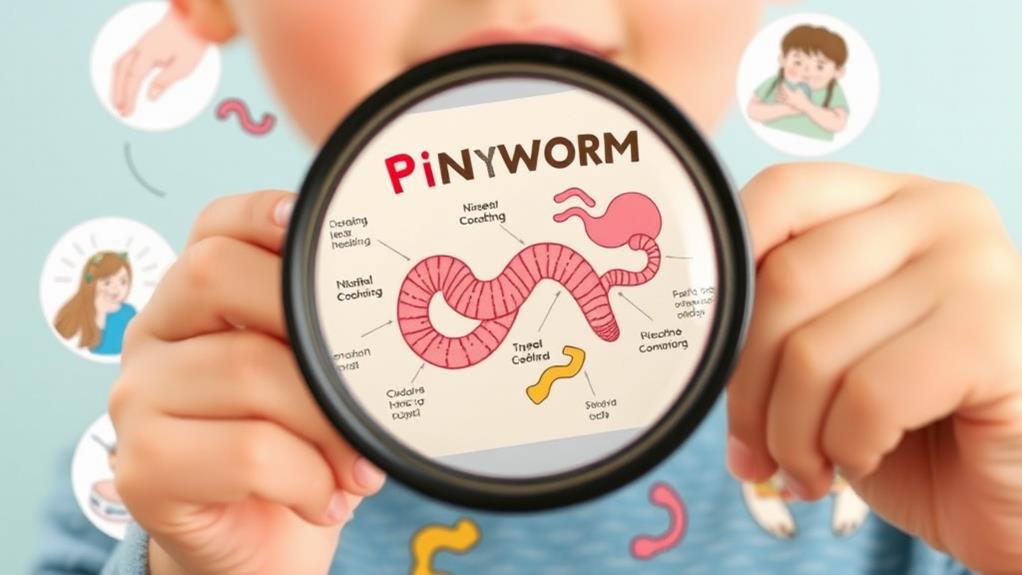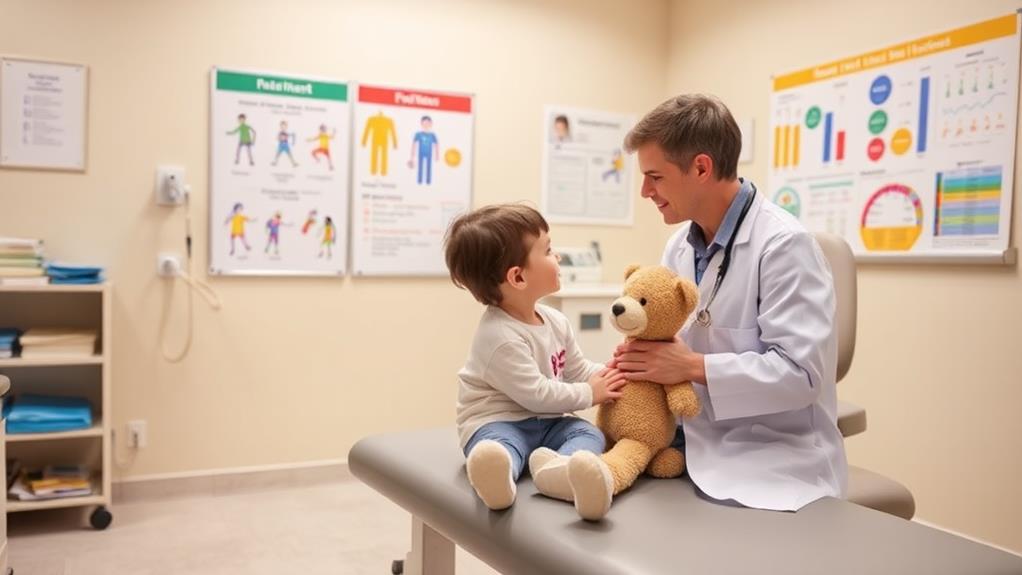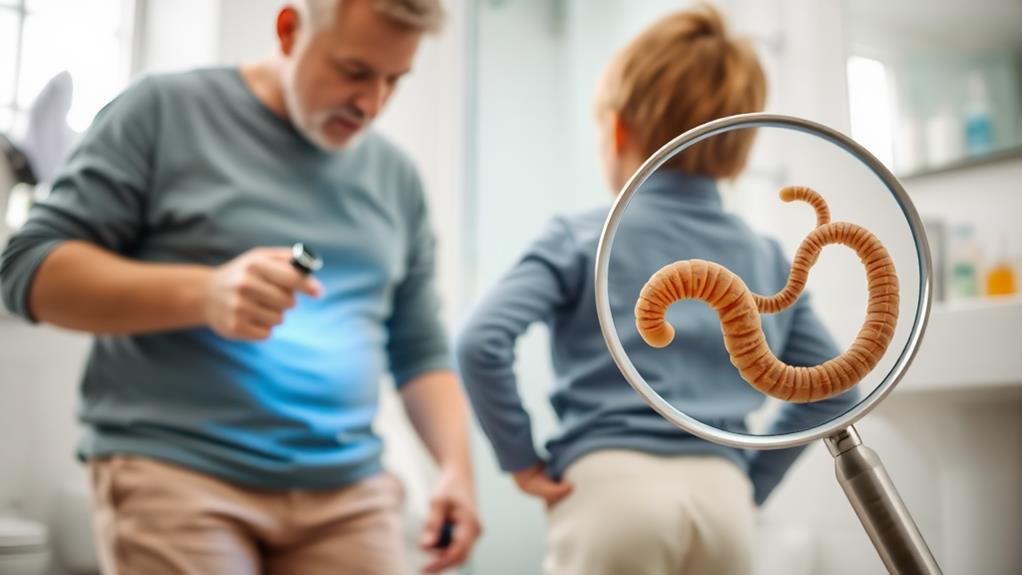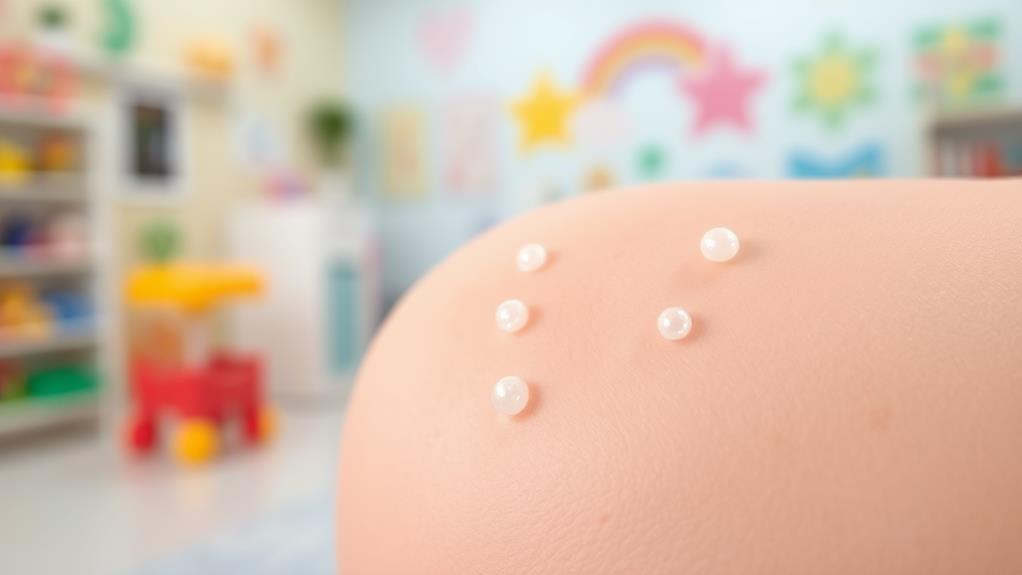Pinworms in Kids: Symptoms, Treatment, and How to Prevent Them
If you suspect your child might have pinworms, you're not alone—these pesky parasites are surprisingly common. You might notice symptoms like intense itching, which can disrupt sleep and lead to irritability. Treatment is straightforward, but understanding how to effectively tackle this issue and prevent it from recurring is crucial. You'll want to explore not only the medical options available but also the practical steps you can take at home. What should you know about keeping your child safe from these unwelcome guests? The answers might surprise you.
Understanding Pinworms

Pinworms are tiny parasites that can cause discomfort and irritation, especially in children. They're often found in the intestines and can be easily transmitted from one person to another. If you're wondering how this happens, it's usually through the ingestion of pinworm eggs, which can be present on contaminated surfaces, clothing, or even hands. Kids, being curious and often less attentive to hygiene, are particularly at risk.
These worms are small, white, and look a bit like threads. They typically come out at night to lay their eggs around the anus, which can lead to itching and restlessness.
It's important to remember that pinworms don't indicate poor hygiene; they can affect anyone, regardless of cleanliness.
Understanding how pinworms work is the first step in managing and preventing them. You might want to encourage your child to wash their hands regularly, especially after using the bathroom and before eating.
Regularly cleaning bedding and toys can also help reduce the risk of transmission. Staying informed about pinworms can help you take effective steps to keep your family healthy and comfortable.
Common Symptoms in Children
Itching around the anus is one of the most noticeable signs that your child may have pinworms. This discomfort often leads to restlessness, particularly at night when the pinworms are most active. You might notice your child scratching the area, which can worsen the irritation and lead to secondary infections.
In addition to itching, look out for sleep disturbances. Your child might've trouble falling asleep or experience frequent awakenings. Other symptoms can include irritability and general discomfort, which may be difficult to pinpoint but are important to recognize.
You may also observe changes in your child's appetite or bowel habits. Some kids report stomach pain or discomfort, while others might've diarrhea or constipation.
Another telltale sign can be found in their bedding or clothing. If you notice tiny white eggs or worms, especially around the anal area, that's a clear indicator.
If you suspect pinworms, it's essential to keep a close eye on these symptoms. Identifying these signs early can help you address the issue more effectively and ensure your child feels comfortable again.
Effective Treatment Options

If your child is showing signs of pinworms, it's important to act quickly to relieve their discomfort and eliminate the infection.
You'll want to consult your child's doctor, who can recommend effective medications. The most common treatment is a prescription or over-the-counter medication like mebendazole or pyrantel pamoate. These medications work by killing the adult worms, usually requiring a dose followed by another after two weeks to ensure any newly hatched eggs are also treated.
In addition to medication, it's crucial to maintain good hygiene. Encourage your child to wash their hands thoroughly, especially after using the bathroom and before meals.
You should also wash all bedding, pajamas, and towels in hot water to eliminate any lingering eggs. Vacuuming carpets and furniture can help, too, as it removes eggs that may have fallen unnoticed.
Home Remedies for Pinworms
Exploring home remedies can provide additional support in managing pinworm infections. While it's important to consult with a healthcare provider, some natural solutions might help alleviate symptoms and support overall health.
One popular remedy is garlic. You can incorporate it into your meals or take it in supplement form, as its natural properties may help combat pinworms.
Another option is consuming pumpkin seeds, which are known for their anti-parasitic qualities. Try eating a handful each day for a potential boost in your defense against these pesky worms.
Probiotics can also play a role in maintaining a healthy gut, which is essential during an infection. You can find probiotics in yogurt or purchase them as supplements.
Additionally, consider increasing your intake of fiber-rich foods, as they can help promote regular bowel movements, making it harder for pinworms to thrive.
Lastly, maintaining good hygiene practices, like washing hands frequently and keeping nails trimmed, is vital.
While these home remedies may offer some relief, remember they're best used alongside conventional treatments. So, don't hesitate to reach out to your doctor for the best course of action.
Preventive Measures for Parents

Preventing pinworm infections in kids starts with vigilance and good hygiene practices. First and foremost, make handwashing a priority. Encourage your children to wash their hands thoroughly with soap and water after using the bathroom, before meals, and after playing outside. This simple habit is one of the most effective ways to keep pinworms at bay.
Next, keep your child's nails trimmed and discourage nail-biting or thumb-sucking. Pinworm eggs can cling to undernails, so shorter nails reduce the chances of contamination.
Regularly cleaning your child's bedding and pajamas is also essential. Wash these items in hot water at least once a week to eliminate any lingering eggs.
You should also remind your kids not to share personal items like towels, combs, or clothing, as this can spread pinworms.
Vacuuming your home frequently can help remove any eggs from carpets or furniture.
Lastly, educate your children about the importance of not touching their faces or mouths with dirty hands, as this can lead to infections.
When to See a Doctor
Knowing when to see a doctor about pinworms can be crucial for your child's health. If you notice any signs of pinworm infection, like intense itching around the anus, especially at night, it's a good idea to consult a healthcare professional.
You should also take action if your child complains of stomach pain, has trouble sleeping, or experiences irritability, as these can indicate a more serious issue.
If you've tried over-the-counter treatments but haven't seen any improvement after a couple of weeks, it's time to reach out to a doctor. Persistent symptoms can signal a need for prescription medication or further evaluation.
Additionally, if your child has a weakened immune system or other underlying health conditions, getting medical advice sooner rather than later is vital.
Don't hesitate to ask questions during your visit. Understanding the treatment plan and any necessary follow-up will help you feel more at ease.













Post Comment